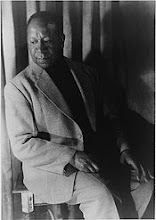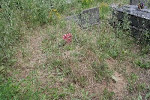On November 22, 2021, art historian Karima Boudou presented research that explored the double-sided concept of "style as a function of meaning" and "meaning as a function of style" when the two pertain to the work of art historians and art critics.
Funded by the Collège des Bernardins in Paris for a project called "L'Art au présent" ("Art in the Present"), Boudou examined this topic using several Beauford Delaney works as her proverbial lens. Her paper is entitled "Redécouvrir le Style et l'Implication dans l'Œuvre de Beauford Delaney" ("Rediscovering Style and Its Implication in the Work of Beauford Delaney").
Boudou began working with the intent to answer two questions:
What does Beauford Delaney's œuvre expect from us in 2021 from a French perspective?
and
What can we expect from his œuvre?
Some of the paintings she used to investigate these questions were Village (Saint-Paul de Vence), Portrait of Irene Rose, and Portrait of Jean Genet.(1972) Oil on canvas
Bequest of James Baldwin
Image courtesy of Clark Atlanta University Art Galleries
(1944) Oil on board
45 1/2 in x 35 in
© Estate of Beauford Delaney
by permission of Derek L. Spratley, Esquire,
Court Appointed Administrator
Photo courtesy of ACA Galleries, New York
(1972) Oil on canvas
© Estate of Beauford Delaney
by permission of Derek L. Spratley, Esquire,
Court Appointed Administrator
Boudou supported her analysis with elements drawn from the philosophy of Erwin Panofsky, the 19th-20th-century art historian known for his iconographic approach for evaluating visual art works. She created scenarios that demonstrate how the art historian's work relies on that of the art critic and vice versa, comparing them to two halves of an arc that require each other to be able to stand erect and bear weight.
She spoke of the art historian's work as searching for "facts" and the art critic's work as making "value judgments," pointing out that both professionals rely heavily on their knowledge of previously identified works to evaluate newly discovered ones. And she contended that viewers of Beauford's work cannot truly "see" (interpret) it without knowing his story.
Regarding Beauford's œuvre, Boudou observed that Beauford may have considered the inclusion of messages in his art to be aesthetically restrictive, despite the fact that he was profoundly affected by the events of his time. She described these messages as subtle, saying that they push the viewer to reflect and look at his work more closely and attentively.
Boudou said that Beauford's œuvre proves that he constantly pushed himself to discover new ways to express himself. She described his works as technically and aesthetically excellent and says that these qualities place them in the "universal domain."







No comments:
Post a Comment